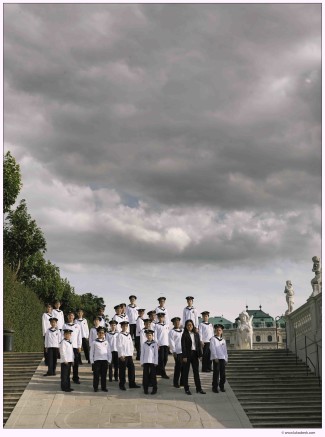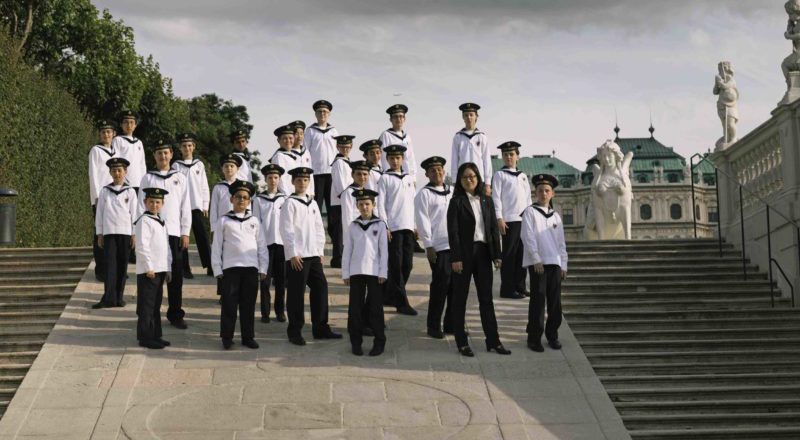REVIEW: Carnegie Hall plays host to holiday singing of Vienna Boys Choir

NEW YORK — The Mozart group of the historic Vienna Boys Choir, under the conductorship of choirmaster Bomi Kim, often travels the world during the Christmas season to offer classic carols and modern holiday fare to audience members looking for a little culture with their consumer-heavy holiday. There’s a purity and simplicity to the choir’s performance that allow the original compositions, including songs by Antonio Vivaldi, Henry Purcell, Francis Poulenc and others, to shine brightly. These boys, members of an elite group that dates back hundreds of years, collectively imbue the holiday with a shared voice that is as inspiring as it is timeless.
The program, lasting two hours with intermission, began with Vivaldi’s “Gloria — Domine Deus — Quoniam tu solus sanctus” from Gloria in D. It was a fitting introduction to the power of the choir, which stood in two groups on the Carnegie Hall stage, with Kim either conducting or playing piano in between. Other selections in the first half stuck to the sacred and classical: Claudio Monteverdi’s “Ave Maria” from Sacrae cantiunculae tribus vocibus, excerpts from Purcell’s Come Ye Sons of Art Ode for the Birthday of Queen Mary II and Johann Sebastian Bach’s “Jesus Bleibert Meine Freude” from Herz und Mund und Tat und Leben.
Throughout these selections, the choir’s mastery of the lyrics and musical notes was only matched by the touching solos offered by a few of the boys. Purcell’s excerpts were a real highlight.
It should be noted, for those unaware of the Vienna Boys Choir, the only instrumental accompaniment to the voices on stage was Kim’s piano, and even then, sometimes she stood and simply conducted. This was a true choral concert.
“Ave Maria,” a classic obstacle for sacred composers, was featured in a couple variations. In addition to Monteverdi’s take, there was also the 19th-century one by Camille Saint-Saëns. George Frederick Handel was represented but not by the usual selection from his Messiah. The “Hallelujah” chorus was absent from the program; instead, audiences were treated to “He Shall Feed His Flock,” an aria and duet.
The final part of the first half included Poulenc’s “Ave verum corpus'” Wolfgang Amadeus Mozart’s “Laudate Dominum” from Vesperae solennes de confessore, which is an aria for soprano and choir; excerpts from Franz Schubert’s Ständchen; and “Tomorrow Shall Be My Dancing Day,” an English carol arranged by John Rutter, a nice first-half closer.
After one hour of singing on stage, the boys had been through a whirlwind of top composers, bringing the writers’ iconic work to the packed crowd at Carnegie Hall. The diversity of offerings continued in the second half, when the choir sang selections more recognizable to the audience, which skewed young (and young at heart).
“O Holy Night,” by Adolphe Adam, is a beautiful song, especially when given the pure, refined treatment that is the unmistakable quality of the Vienna Boys Choir. Ditto for “The First Nowell,” arranged by Gerald Wirth.
If there had to be a gripe (a minor one) it’s that the concert lowered the artistic bar and ended with musical candy canes for the crowd. It’s never unpleasant listening to Felix Bernard’s “Winter Wonderland,” Hugh Martin and Ralph Blane’s “Have Yourself a Merry Little Christmas” or Jule Styne’s “Let It Snow!,” but it’s somewhat jarring when they follow pieces by Mozart and Bach. One could say the choir traveled chronologically from the Renaissance and Medieval time period to the 20th century, and that’s why the inclusion of these well-known classics are appropriate. But sometimes fitting too many time periods into the span of two hours can make the concert feel pulled in one too many directions.
However, there’s still no denying the joy that the choir brings to the songs, even if they are as recent as José Feliciano’s “Feliz Navidad” from 1970. “Jingle Bells” by James Lord Pierpoint and “Joy to the World” by Lowell Mason and Handel finished the program. An encore sing-a-long seemed appropriate, especially for the kids in the audience.
The Vienna Boys Choir is rightfully respected as a place for young boys to share their singing talents with the world. They are steeped in choral tradition and institutional history, and their sound is one of purity and angelic voices. They are a welcome inclusion to the busy holiday season.
By John Soltes / Publisher / John@HollywoodSoapbox.com
- The Vienna Boys Choir performed at Carnegie Hall Sunday, Dec. 13 at 2 p.m. Click here for more information.

